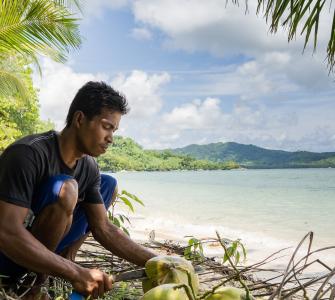Safeguarding Coconut Biodiversity for Sustainable Livelihoods
The economic costs of biodiversity loss at the crop level is a critical issue that warrants immediate attention.
Biodiversity plays a fundamental role in maintaining ecosystem stability, enhancing agricultural productivity, and ensuring food security. When biodiversity is compromised, the resilience of ecosystems diminishes, leading to a decrease in crop productivity, and an increased vulnerability to climate change, pests and diseases in the agriculture of the region. These consequences impact local and global economies by compromising crop availability, price stability, and local livelihoods.
Coconuts, a vital crop for many tropical regions, exemplifies the far-reaching impacts of biodiversity loss on specific supply chains. The coconut industry supports millions of smallholder farmers and contributes significantly to the economics of countries like the Philippines, Indonesia, and India. However, a monoculture approach to coconut agriculture has led to a decline in genetic diversity of the crop, and made coconut yields vulnerable - disrupting supply chains and global markets.
Recognizing the economic impacts of this biodiversity loss in the coconut supply chain is crucial to ensure global investment in biodiversity conservation and the diversification of cropping systems. These investments would not only help mitigate the economic risks to local and global supply chains, but would sustainably stabilize the coconut industry, enabling farmers to continue to nourish their communities and economics with this powerful crop.
CSF has worked with The Crop Trust to identify the key stakeholders involved in the coconut crop industry to determine how best to support the sustainability and biodiversity of the global coconut supply chain in the Philippines, Papua New Guinea and Côte D'Ivoire. The study identified the farmers, traders, processors, exporters, and institutions most affected by biodiversity loss, highlighting opportunities to enhance resilience through training, capacity building, and inclusive finance.
Key Results
Across three major coconut-producing countries, our research showed how vital coconut biodiversity is for both livelihoods and economies. In Côte d’Ivoire, coconut farming supported over 20,000 families, with women leading much of the harvesting and marketing, and companies like COCOPACK and cooperatives in Sassandra connecting farmers to global markets.
Papua New Guinea tells a different story. There, nearly 2.6 million people—more than a third of the population—depend on coconuts, mostly through subsistence farming. The country is the largest producer of copra in the Pacific, with three major oil mills exporting crude coconut oil and copra meal. While the industry contributes significantly to rural livelihoods, much of the production chain remains underdeveloped. We found that improving local processing and diversifying coconut products could create more value and resilience for communities, especially in the face of climate change and extreme weather.
In the Philippines, coconuts are truly central to the national economy. The country has the largest area of coconut plantations in the world, providing employment for 2.5 million farmers and making up over a third of its agricultural exports. Yet productivity per hectare remains among the lowest globally, due to aging trees, pest outbreaks, and frequent typhoons. Our mapping revealed a highly complex supply chain, with millions of small farmers, thousands of intermediaries, hundreds of processors, and a wide network of exporters and institutional agents. We saw how farmers’ associations and cooperatives are crucial in commercializing production, while processors and traders face pressure to modernize and diversify.
What we learned across all three countries is that conserving coconut diversity is not just a scientific or environmental issue—it is an economic and social imperative. Farmers, traders, processors, and consumers all have a role to play in strengthening resilience by adopting diverse varieties, improving farming practices, and supporting conservation. Our findings underscore the need for training, capacity building, and finance mechanisms that reward farmers and companies for safeguarding coconut diversity. By recognizing the many stakeholders involved, we can ensure that coconuts remain a reliable source of food, income, and resilience for millions of people in the decades to come.
___
Photo: Man harvesting coconuts in the Phillipines. Courtesy of victor cuenca lopez via Shutterstock

